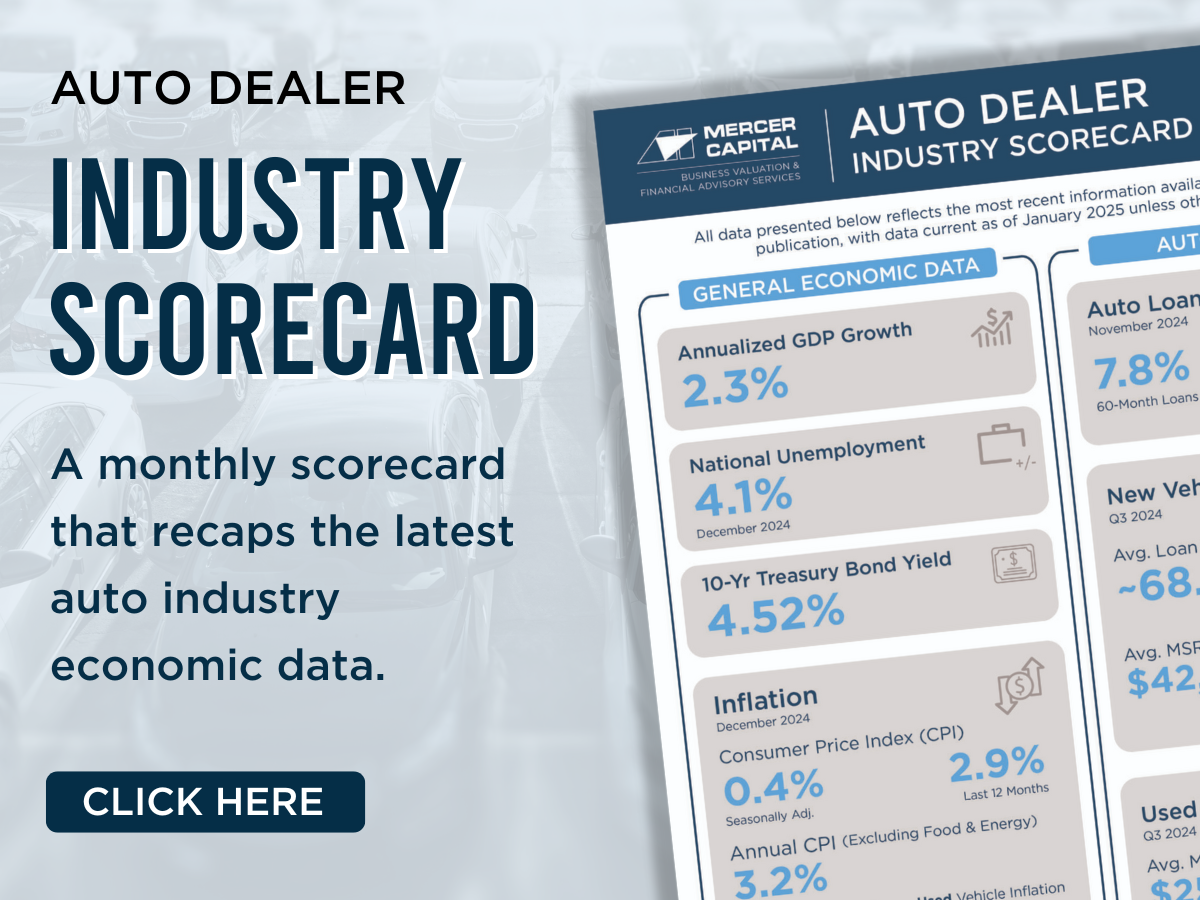Seven Factors of a Highly Effective Buy-Sell Agreement for Auto Dealerships
A Roadmap to the Valuation Process
A few of our recent auto dealership valuation engagements have involved disagreements among family members and the next generation or what might otherwise be termed a business divorce. Inevitably, one of the first questions I always ask “Is there a buy-sell agreement or governance document that will provide a roadmap into the valuation of the business and the respective subject interests?” Often the answer is “I’m not sure, I don’t know, or maybe but we haven’t reviewed it in some time.”
We’ve also encountered plenty of examples where these documents exist, but they are either poorly written, do not contain the necessary information, or have not been contemplated in many years since the drafting of the document. In Stephen Covey’s popular management book, he discussed the seven habits of highly effective people. In this post, we cover seven factors of a highly effective buy-sell agreement for auto dealerships and also touch on several other considerations.
1) Standard of Value
The standard of value establishes the parameters for how the auto dealership will be valued. It should be clearly defined and give clear indications for how the participants in a hypothetical transaction should be viewed: buyer, seller, motivations, knowledge of facts, etc. The most common standard of value is fair market value and is generally defined as a hypothetical buyer and a hypothetical seller both having reasonable knowledge of the business and all relevant factors and neither being under any compulsion to buy or sell.
The other most common standard of value in buy-sell agreements is fair value. Simply put, fair value is fair market value without consideration of any applicable discounts for lack of control and lack of marketability for the subject interest. Fair value is often used in legal proceedings. The difference between these two standards of value and the lack of clarity in defining which standard is governed by a company’s buy-sell agreement is often the impetus to litigation.
2) Level of Value
Level of value is a valuation concept describing the differences between various “levels” of a company’s value. Levels of value can include financial control, strategic control, marketable minority interest, and non-marketable minority interest. Each level has a distinct difference in the amount of control one can exhibit over the operations of a business and/or their ability to sell an interest in that business. For the layperson, the levels of value ultimately dictate whether premiums or discounts would be applied to the subject interest being valued.
3) Define Triggering Events
If the goal of a buy-sell agreement or governance document is to provide a roadmap for the valuation, then it’s important for these documents to define the events that will be governed under their parameters. These events are often referred to as triggering events and can include the death of an owner, termination of an owner, divorce, change of control, etc. By defining the triggering events, it will be clear when the document will be enacted and enforced and when it will not apply. For example, selling or gifting a minority interest in the business to future generations is not likely to be a triggering event in this context and almost certainly would not be valued at anything besides the nonmarketable minority level of value.
These events can also have unique ramifications on auto dealerships. For example, each franchised dealer has a dealer principal that has to be approved by the manufacturer. The death or divorce of a dealer principal can also pose challenges as the transferability of that interest and title of dealer principal is not guaranteed and cannot occur without approval from the manufacturer.
4) Avoid Formula Pricing
Often these documents contain a formula or a methodology to value the business. The formula might consist of the applicable financial information to consider and the multiple to apply to those metrics to determine the value. At the time of the drafting of the buy-sell, these formulas might establish the shareholder’s perceived value of the business. If considerable time has passed between the drafting of the document and the triggering event, these formulas and concluded values could be stale and outdated.
As we’ve previously discussed in this space, the auto dealership industry is unique from a valuation perspective. Traditional formulas such as EBITDA multiples often utilized in other industries are not as informative in this industry. The drafting attorney may not be as familiar with the nuances of auto dealership valuation. Even if an industry-appropriate metric, such as a Blue Sky multiple or formula is used, it is likely be dated in a short period of time. National auto brokers (Haig Partners and Kerrigan Advisors) publish and update these Blue Sky multiples by manufacturer quarterly. As we’ve seen during the COVID-19 pandemic, operational conditions and perceived franchise values can change both quarterly and over a longer time horizon. Additionally, dealerships could evolve over time and acquire or divest of different franchises that could drastically change their operations and perceived value.
Finally, what adjustments are to be considered? Even if a buy-sell agreement has language providing for a multiple to be updated with the current market environment, significant one-time or non-recurring income or expense items can inflate or depress value.
5) Specify Valuation Date
The buy-sell agreement should explicitly define the date to be used for the valuation. Typically, the date of valuation would be at or near the triggering event depending on its proximity to the timing and availability of current and reliable financial information. A proper valuation should consider what is reasonably known or knowable as of the date of valuation. Any ambiguity in defining the valuation date or the financial information to be used could have a significant impact on value. Since franchised auto dealers must submit monthly financial statements to the manufacturer, an appropriate valuation date might be set to be the month-end prior to the triggering event.
6) Defining Appraiser Requirements
Who should perform the valuation? Often buy-sell agreements will utilize language such as a “qualified appraiser” and may even include certain valuation credentials such as an Accredited Senior Appraiser (ASA), someone who is Accredited in Business Valuation (ABV), or a Certified Valuation Analyst (CVA) from national valuation accrediting organizations. Since the auto dealership industry is so unique, these credentials may not be enough. Should your buy-sell agreement also require that the appraiser have specific industry experience? Finally, independence is key. We recommend selecting a third-party valuation firm with experience in valuing auto dealerships so that the appraiser will be qualified and unbiased.
7) Make It a Living Document
How often does a company have a buy-sell agreement or governance document drafted only to be placed in an electronic file, a desk drawer, or a file cabinet and never reviewed or contemplated again? The value of an effective buy-sell agreement is to provide a roadmap for how to value the dealership at a triggering event. If the document was never used since drafting, can it be reliable?
Effective buy-sell agreements are not only drafted, but they are utilized. Some require ongoing valuations at annual anniversaries or other timeframes to provide the owners with a value indication that could be used for strategic planning or contemplation of an upcoming triggering event.
If the document didn’t clearly contain the items in this post and was never used since drafting, it could create confusion leading to litigation or the buy-sell agreement could be ignored in an eventual litigation. Frequent use or at least consideration of the terms considered in the document are likely to be much more relevant in a litigation context.
Conclusion and Considerations
An effective buy-sell agreement can provide a roadmap to defining the valuation process through many challenging events during the lifetime of an auto dealership. As we’ve discussed, the document should contain and clearly define these seven elements, among others, to accomplish that goal.
Other considerations to contemplate are the premise of value, funding mechanisms for repurchase, and managing expectations. The premise of value will establish whether to determine the value of the dealership if it continues as a going-concern business as opposed to liquidation. Funding mechanisms and repurchase requirements can also dictate the mechanical treatment of certain assumptions in the valuation such as the impact of recognizing life insurance proceeds at the death of an owner to establishing a market for the subject interest that could possibly impact the applicable discount for lack of marketability.
Does your auto dealership have a buy-sell agreement or governance document? When was it drafted? Who drafted it? Does it contain and discuss these seven key items? If it contains formula pricing, would buyers and sellers find the methodology employed reasonable today? These are all items that need to be considered.
To discuss the impact of your buy-sell agreement, assist you and your attorney in drafting an effective buy-sell agreement, or determine the valuation of your auto dealership at a triggering event, contact a professional at Mercer Capital today.
 Auto Dealer Valuation Insights
Auto Dealer Valuation Insights 








